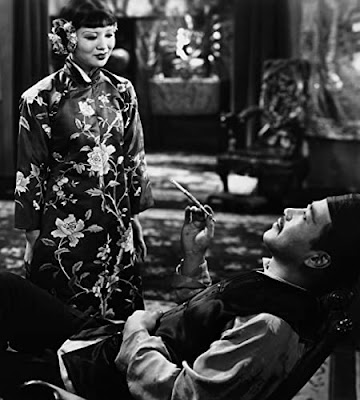Starring: Lois Wilson, Grant Withers, Eddie Boland, Toshia Mori, Tetsu Komai, Richard Loo, Dorothy Revier, and Robert Warwick
Director: Richard Thorpe
Rating: Six of Ten Stars
Nona (Wilson), a destitute young writer is rescued from a suicide attempt and given a lifeline by way of a job by newspaper editor James Manning (Withers). In order to repay his kindness, Nona works along-side with a veteran reporter (Boland) to use her Chinatown contacts to investigate a human smuggling ring in the hopes of delivering a spectacular scoop. The reporters attract the attention of both the sinister leader of the crime ring, Wu Sin (Komai) and even more dangerous people who hide behind shields of respectability.
"The Secrets of Wu Sin" is jam-packed with plot and characters, hits the ground running and doesn't stop until "The End" appears on the screen. Amazingly, and unlike what happens in many films of this period, the main plot and the subplots are all introduced sensibly (if with a healthy dose of melodrama) and all unfold at a steady and engaging pace. Although I saw some of the twists coming as soon as the involved characters appeared on screen--either because I've seen many hundreds of crime dramas, or because it's been 90 years since this film premiered and some of the story elements that were surprising then are stock fare now--but the story was so well executed that it didn't matter. (It was a little more straight-forward than I initially imagined, but it perhaps even worked even better than what I imagined.)
An aspect that makes this film worth watching today is that the story deals with a number of issues that pop up in the U.S. media even to this day, such as illegal immigration. It also makes the point that criminals that exploit recent immigrants to the U.S.--especially those who come here illegally--would not be able to do what they do without the assistance of "respectable" Americans, as well as the wealthy who want the cheap labor and captive labor that illegal immigrants have no choice but to provide. Would there still be criminals exploiting immigrant communities? Certainly. But would they be able to be as exploitive and assertive without the help and protection of those from outside the communities who benefit and even abet their activities? No. This was true in 1932, and it remains a sad truth in 2022.
There's also an interesting side issue of second generation (or later) immigrants and how they might interact with more recent immigrants, as well as how they view and are viewed by immigrant communities. This issue is carried in the romantic subplot involving Nona's recent Chinese immigrant friend Miao (played by Toshia Mori) and American-born Charlie (Richard Loo). Miao is under the thumb of Wu Sin, and Charlie ends up being swept into Tong activities as a result, despite his continued appeal that Miao should abandon her traditional Chinese ways. It's an interesting subplot that might be derailed by the main plot, or perhaps even cause the main plot to rerail, in a less-efficiently plotted movie. It also helps that Miao and Charlie are both likeable characters, portrayed by likeable actors.
And speaking of actors: One remarkable thing about "The Secrets of Wu Sin", for a film of this type and from this period, is that all the leading Chinese characters are played by Asian actors rather than Caucasians in make-up that may of varying degrees of ridiculousness. Sure--only one of these actors is actually of Chinese extraction (Richard Loo, who, ironically, is best known for playing Japanese characters), but it's nice to see Asians on-screen, playing Asian characters, be they villains, victims, or heroes.
What isn't remarkable is the acting, even taking into the account the universal charisma and screen presence of everyone in a significant part in "The Secrets of Wu Sin". Even by low-budget, early talkies standards, the actors are almost universally struggling with awful dialog that is made more obvious by stagey performances. The bad dialog is one of the few weak spots in this film, but it so pervasive that it dragged the film down from my awarding it a Seven Rating to giving it a High Six instead. Interestingly, the exchanges are livelier and less stilted in scenes featuring Eddie Borland, whether he's sharing the screen with Tetsu Komai, Lois Wilson, or Grant Withers. Maybe more of those lines were ad-libbed than elsewhere in the film and Borland's vast experience acting on stage and in front of cameras is shining through? (It's also worth noting that although Borland's character of Eddie is the comic relief in the film, he's not as annoying nor stupid as those tend to be in films of this period.)
Another drag on the film is heroic lead Grant Withers. I found him very entertaining in in the Mr. Wong films, but here, aside from his first major scene with co-star Lois Wilson, he is unimpressive and dull. I can't decide if it's the lines he has suffering through, of if it's because he only excels at playing blustery angry characters (like Captain Street in the "Mr. Wong" films) and so fails at more level-headed, low-key characters like the diplomatic and task-focused James Manning in this picture. Since I am primarily familiar with Withers through his role of Captain Street, I can't fairly judge him here. I will have to watch for him elsewhere.)
Ultimately, I think the good--a strong story and a cast of likeable actors--outweighs that bad in "The Secrets of Wu Sin". If you enjoy mysteries from the Poverty Row studios of the early 1930s, I think you'll like this one. You can find it on DVD with the bonus feature "The Law of the Tong" (review coming some day, watch this space!) or streaming on Amazon Prime.





































%20in%201962.jpg)







.jpg)
